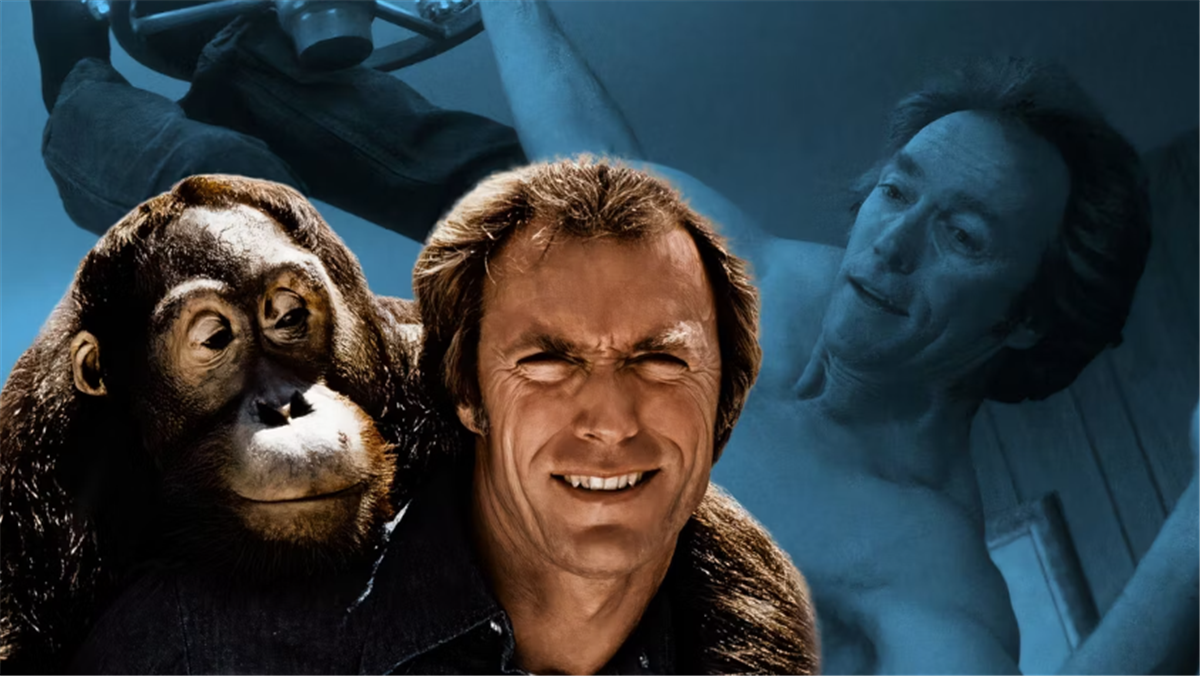Clint Eastwood has always had a dry sense of humor as an actor, especially in the Dirty Harry films, which charmingly edge close to parody through his ability and willingness to poke sly fun at his incomparable screen persona while maintaining an air of competence and strength. Eastwood entered the realm of comedy and sheer silliness with the 1978 action comedy film Every Which Way But Loose and the 1980 sequel Any Which Way You Can, in which he plays Philo Beddoe, a bare-knuckle fighter and truck driver whose best friend is a cheeky, oversexed orangutan named Clyde.
Eastwood was drawn to Every Which Way But Loose by a desire to extend his commercial reach beyond his core action base. The actor hoped to reach the same blue-collar audience Burt Reynolds tapped into with the blockbuster 1977 action comedy film Smokey and the Bandit, which grossed over $100 million at the domestic box office.
Eastwood followed suit with Every Which Way But Loose, which became his first film to cross the $100 million mark at the domestic box office, while Any Which Way You Can was one of the highest-grossing films of 1980. This is especially impressive given that Every Which Way But Loose and Any Which Way You Can were generally savaged by critics, with the latter holding a 20% on Rotten Tomatoes, many of whom were horrified by how Eastwood seemed so cheerfully willing to allow himself to be upstaged by an orangutan.
Philo Beddoe Is Clint Eastwood’s Craziest Role

Besides scene-stealing orangutan Clyde, Clint Eastwood, as Philo Beddoe, is joined in Every Which Way But Loose and Any Which Way You Can by a gallery of oddball supporting characters. In Any Which Way You Can, Philo is surrounded by bumbling best friend and manager Orville and Orville’s foul-mouthed mother, along with corrupt cops, Nazi bikers, mafia men, and Philo’s love interest, country music singer Lynn Halsey-Taylor, played by longtime Eastwood co-star and real-life romantic partner Sondra Locke.
In Any Which Way You Can, Philo, having retired from fighting after throwing the climatic fight in Every Which Way But Loose, rekindles his relationship with Lynn, who is subsequently kidnapped by the mafia for the purpose of forcing Philo to fight legendary brawler Jack Wilson, played by perennial tough-guy actor William Smith.
Much of the success of these films is attributable to the immensely lovable Clyde, who represents the most personal, touching relationship in Philo’s life and much of Eastwood’s career. Amid a barrage of chases, fist fights, and the sight of Clyde relieving himself in a police car, the sequel has tender scenes in which Philo confesses his innermost secrets to Clyde, who is only allowed to drink beer on Saturday nights for reasons that become embarrassingly obvious.
Any Which Way You Can portrays Clyde as a sexual being. To provide him with female companionship and satisfy his strong sexual urges, the devoted Philo drugs and abducts a primate from a zoo and brings it to a motel, where Clyde and his new primate girlfriend have loud sex, much to the consternation of the motel’s other guests. The comedic timing between Philo and Clyde is impeccable. While Philo is able to make Clyde fall down like he’s been shot in Every Which Way But Loose by simply pointing a finger at him and pressing an imaginary trigger, Philo can make Clyde unleash a powerful right-hand punch in the sequel through a “Right hand, Clyde” command, which is undoubtedly one of the most iconic catchphrases in Eastwood’s career.
Clint Eastwood Turned Monkey Business Into Box-Office Gold
While Any Which Way You Can failed to surpass the $100 million mark at the domestic box office like its predecessor, Any Which Way You Can, which grossed over $70 million at the domestic box office, nonetheless became the fifth-highest-grossing film of 1980, behind Kramer vs. Kramer and ahead of Private Benjamin.

Any Which Way You Can is Eastwood’s highest-grossing film of the 1980s, ahead of Sudden Impact, the fourth installment in the Dirty Harry film series, which grossed more than $67 million domestically. When adjusted for inflation, Any Which Way You Can and Every Which Way But Loose rank as the two highest-grossing films in his career.
This 1989 Flop Made Eastwood Quit Comedy
Despite the box-office success of Any Which Way You Can, Clint Eastwood never again attempted straight comedy. The closest he came to playing a comedic role following Any Which Way You Can was in the 1989 action comedy film Pink Cadillac, where he plays Tommy Nowak, a skip tracer of various disguises who falls in love with the woman he’s trying to apprehend.
Eastwood was drawn to Pink Cadillac, directed by Any Which Way You Can director Buddy Van Horn, because he thought Pink Cadillac had the same reckless spirit as Every Which Way But Loose and Any Which Way You Can and hoped it would have similarly broad appeal.
However, the public’s mood had shifted considerably over the previous decade, and Pink Cadillac became a box-office and critical disaster. This was symbolic of a steep downturn in Eastwood’s career in the late 1980s and the start of the 1990s. Following Pink Cadillac, the actor returned to the stoicism that most clearly defined his career, in which his comedic detour in the orangutan films has become a curious footnote. Any Which Way You Can is available to rent on iTunes and Prime Video.
